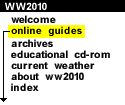
|

Graphic by: Steven E. Hall
The Online Meteorology Guide is a collection of web-based instructional modules that use multimedia technology and the dynamic capabilities of the web. These resources incorporate text, colorful diagrams, animations, computer simulations, audio and video to introduce fundamental concepts in the atmospheric sciences. Selected pages link to (or will soon link to) relevant classroom activities and current weather products to reinforce topics discussed in the modules and allow the user to apply what has been learned to real-time weather data. Available modules include:
| Modules
Last Update: 09/02/99 |
Light and Optics
The interaction between light and atmospheric particles and the colorful optical effects that result.
Clouds and Precipitation
Forces and Winds
Air Masses and Fronts
Weather Forecasting
Severe Storms
Hurricanes
El Niño
Hydrologic Cycle
|
The target audience for the Online Meteorology Guide is high school and undergraduate level students. However, these resources have been used by instructors throughout K-12, undergraduate and graduate level education. Contents of the Online Meteorology Guide were developed by graduate students and faculty through our efforts in the Collaborative Visualization Project (CoVis), which was funded by the National Science Foundation. These resources have been reviewed by faculty and scientists at the University of Illinois and the Illinois State Water Survey. Many of these resources were tested in a classroom environment and have been modified based upon teacher and student feedback.
The navigation menu (left) for this module is called "Meteorology" and the available modules are listed as menu items, beginning with this introduction. Click on the menu item of interest to go to that particular module. In addition, this entire web server is accessible in both "graphics" and "text"-based modes, a feature controlled from the blue "User Interface" menu (located beneath the black navigation menus). More information about the user interface options, the navigation system, or WW2010 in general is accessible from About This Server.

Online Guides |
|

Air Masses, Fronts |


